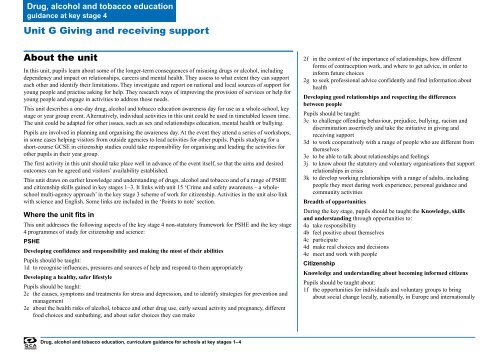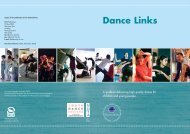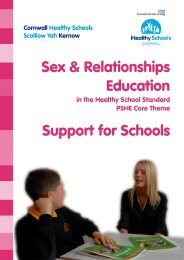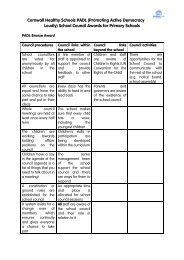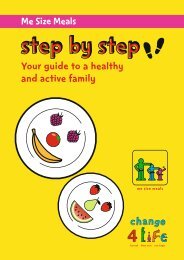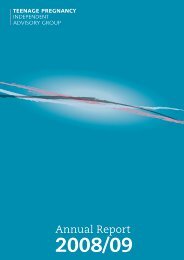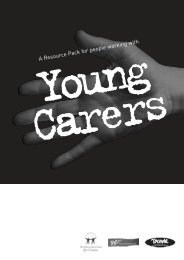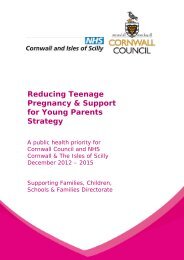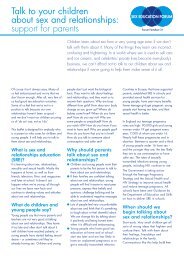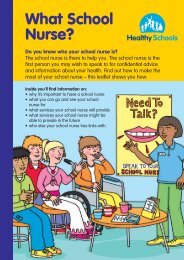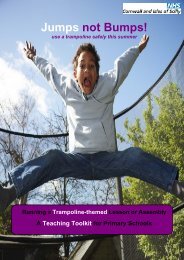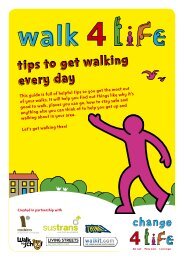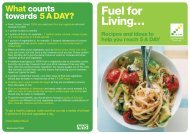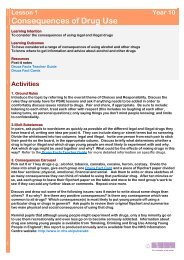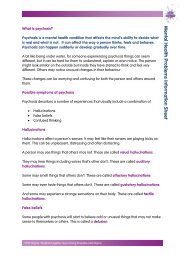Giving and receiving support - Cornwall Healthy Schools
Giving and receiving support - Cornwall Healthy Schools
Giving and receiving support - Cornwall Healthy Schools
You also want an ePaper? Increase the reach of your titles
YUMPU automatically turns print PDFs into web optimized ePapers that Google loves.
Drug, alcohol <strong>and</strong> tobacco educationguidance at key stage 4Unit G <strong>Giving</strong> <strong>and</strong> <strong>receiving</strong> <strong>support</strong>About the unitIn this unit, pupils learn about some of the longer-term consequences of misusing drugs or alcohol, includingdependency <strong>and</strong> impact on relationships, careers <strong>and</strong> mental health. They assess to what extent they can <strong>support</strong>each other <strong>and</strong> identify their limitations. They investigate <strong>and</strong> report on national <strong>and</strong> local sources of <strong>support</strong> foryoung people <strong>and</strong> practise asking for help. They research ways of improving the provision of services or help foryoung people <strong>and</strong> engage in activities to address those needs.This unit describes a one-day drug, alcohol <strong>and</strong> tobacco education awareness day for use as a whole-school, keystage or year group event. Alternatively, individual activities in this unit could be used in timetabled lesson time.The unit could be adapted for other issues, such as sex <strong>and</strong> relationships education, mental health or bullying.Pupils are involved in planning <strong>and</strong> organising the awareness day. At the event they attend a series of workshops,in some cases helping visitors from outside agencies to lead activities for other pupils. Pupils studying for ashort-course GCSE in citizenship studies could take responsibility for organising <strong>and</strong> leading the activities forother pupils in their year group.The first activity in this unit should take place well in advance of the event itself, so that the aims <strong>and</strong> desiredoutcomes can be agreed <strong>and</strong> visitors’ availability established.This unit draws on earlier knowledge <strong>and</strong> underst<strong>and</strong>ing of drugs, alcohol <strong>and</strong> tobacco <strong>and</strong> of a range of PSHE<strong>and</strong> citizenship skills gained in key stages 1–3. It links with unit 15 ‘Crime <strong>and</strong> safety awareness – a wholeschoolmulti-agency approach’ in the key stage 3 scheme of work for citizenship. Activities in the unit also linkwith science <strong>and</strong> English. Some links are included in the ‘Points to note’ section.Where the unit fits inThis unit addresses the following aspects of the key stage 4 non-statutory framework for PSHE <strong>and</strong> the key stage4 programmes of study for citizenship <strong>and</strong> science:PSHEDeveloping confidence <strong>and</strong> responsibility <strong>and</strong> making the most of their abilitiesPupils should be taught:1d to recognise influences, pressures <strong>and</strong> sources of help <strong>and</strong> respond to them appropriatelyDeveloping a healthy, safer lifestylePupils should be taught:2c the causes, symptoms <strong>and</strong> treatments for stress <strong>and</strong> depression, <strong>and</strong> to identify strategies for prevention <strong>and</strong>management2e about the health risks of alcohol, tobacco <strong>and</strong> other drug use, early sexual activity <strong>and</strong> pregnancy, differentfood choices <strong>and</strong> sunbathing, <strong>and</strong> about safer choices they can make2f in the context of the importance of relationships, how differentforms of contraception work, <strong>and</strong> where to get advice, in order toinform future choices2g to seek professional advice confidently <strong>and</strong> find information abouthealthDeveloping good relationships <strong>and</strong> respecting the differencesbetween peoplePupils should be taught:3c to challenge offending behaviour, prejudice, bullying, racism <strong>and</strong>discrimination assertively <strong>and</strong> take the initiative in giving <strong>and</strong><strong>receiving</strong> <strong>support</strong>3d to work cooperatively with a range of people who are different fromthemselves3e to be able to talk about relationships <strong>and</strong> feelings3jto know about the statutory <strong>and</strong> voluntary organisations that <strong>support</strong>relationships in crisis3k to develop working relationships with a range of adults, includingpeople they meet during work experience, personal guidance <strong>and</strong>community activitiesBreadth of opportunitiesDuring the key stage, pupils should be taught the Knowledge, skills<strong>and</strong> underst<strong>and</strong>ing through opportunities to:4a take responsibility4b feel positive about themselves4c participate4d make real choices <strong>and</strong> decisions4e meet <strong>and</strong> work with peopleCitizenshipKnowledge <strong>and</strong> underst<strong>and</strong>ing about becoming informed citizensPupils should be taught about:1f the opportunities for individuals <strong>and</strong> voluntary groups to bringabout social change locally, nationally, in Europe <strong>and</strong> internationallyDrug, alcohol <strong>and</strong> tobacco education, curriculum guidance for schools at key stages 1–4
Developing skills of enquiry <strong>and</strong> communicationPupils should be taught to:2a research a topical, spiritual, moral, social or cultural issue, problemor event by analysing information from different sources, includingICT-based sources, showing an awareness of the use <strong>and</strong> abuse ofstatistics2b express, justify <strong>and</strong> defend orally <strong>and</strong> in writing a personal opinionabout such issues, problems or events2c contribute to group <strong>and</strong> exploratory class discussions, <strong>and</strong> take partin formal debatesDeveloping skills of participation <strong>and</strong> responsible actionPupils should be taught to:3a use their imagination to consider other people’s experiences <strong>and</strong> beable to think about, express, explain <strong>and</strong> critically evaluate views thatare not their own3b negotiate, decide <strong>and</strong> take part responsibly in school <strong>and</strong>community-based activities3c reflect on the process of participatingSciencePupils should be taught:Sc2 2m the effects of solvents, alcohol, tobacco <strong>and</strong> other drugs on bodyfunctionsResourcesResources include:• the DfES PSHE website – www.teachernet.gov.uk/PSHE (informationon resources <strong>and</strong> links to other websites)Many groups <strong>and</strong> organisations produce online resources that are relevantto drug, alcohol <strong>and</strong> tobacco education. QCA has not printed thesewebsite addresses as it recognises that they can <strong>and</strong> do change, often atshort notice. So that we can monitor <strong>and</strong> maintain a reliable <strong>and</strong> usefulresource, the website addresses of the following organisations can beaccessed through www.qca.org.uk/pshe• Department of Health• DrugScope• Alcohol Concern• National Drugs Helpline (provides information on national <strong>and</strong> localagencies offering <strong>support</strong>)NB: care should be taken when encouraging pupils to access websitesExpectationsExpectations should be adapted according to the needs, age, stage <strong>and</strong>maturity of the pupils. It is expected that by the end of this unit mostpupils will: underst<strong>and</strong> that using drugs, alcohol or tobacco can result in arange of health problems <strong>and</strong> harmful consequences. They know thatthere are <strong>support</strong> services <strong>and</strong> initiatives for young people <strong>and</strong> find outabout services available to them. They survey the views of others <strong>and</strong>participate in an activity to improve their local community. They begin toevaluate their own role. They value themselves <strong>and</strong> their peers as sourcesof <strong>support</strong>.Drug, alcohol <strong>and</strong> tobacco education, curriculum guidance for schools at key stages 1–4Unit G
Learning objectives Possible teaching activities Learning outcomes Points to notePupils learn:Pupils:Investigating <strong>support</strong> <strong>and</strong> services for young people with drug-, alcohol- or tobacco-related problems• ways of finding out aboutother people’s views on<strong>support</strong> <strong>and</strong> services foryoung people• to identify questions they wantto find answers to <strong>and</strong> to plantheir investigation• to use a range of informationsources in their research,including ICT• to work with others to plantheir involvement in the drugs,alcohol <strong>and</strong> tobaccoawareness day• Individually or in pairs, the pupils undertake background research to helpplan their drug, alcohol <strong>and</strong> tobacco awareness day/event. Ask them to findout what young people want to know about drugs, alcohol <strong>and</strong> tobacco <strong>and</strong>whether they think there is adequate <strong>support</strong> from local services. Pupilsidentify:– what they want to find out about– who they will consult, eg the whole school, year group, class, teachers,parents/carers– how they will gather opinions, eg through break-time surveys, schoolcouncil, holding meetings• Working in small groups, the pupils design <strong>and</strong> carry out the survey <strong>and</strong>report back to the class on their findings. They then use the findings toidentify aims for a drug, alcohol <strong>and</strong> tobacco awareness day that would meetsome of the information needs <strong>and</strong> bring young people <strong>and</strong> agencies closertogether. They could use local directories, libraries or the internet to identifynational <strong>and</strong> local agencies <strong>and</strong> services that <strong>support</strong> young people inrelation to drug, alcohol <strong>and</strong> tobacco use <strong>and</strong> misuse. The pupils considerwhich of these bodies would best be able to <strong>support</strong> the planned event,ensuring that there would be a balance of activities that would promote skillsas well as providing information. Findings are shared through grouppresentations to the class <strong>and</strong> each class makes a display.• Using their research, pupils work in groups to plan different aspects of theawareness day, including:– contacting potential speakers <strong>and</strong> workshop leaders– planning an exhibition about the services <strong>and</strong> information sourcesavailable, with st<strong>and</strong>s staffed by local agency representatives– where appropriate, organising peer-led activities• carry out research <strong>and</strong>consultation by talkingto a range of school <strong>and</strong>community members toascertain their views <strong>and</strong>opinions• undertake a plannedinvestigation of national <strong>and</strong>local services on sources of<strong>support</strong> available to youngpeople with drug, alcohol ortobacco problems• work together to identify waysof helping their peers todevelop knowledge, skills <strong>and</strong>underst<strong>and</strong>ing in relation todrugs, alcohol <strong>and</strong> tobacco• present their findings toothers <strong>and</strong> give reasons fortheir views• plan <strong>and</strong> organise their owninvolvement in an awarenessday• Link with citizenship: unit 15 ‘Crime<strong>and</strong> safety awareness – a wholeschoolmulti-agency approach’ in thekey stage 3 scheme of work.• When pupils undertake their researchit is important that they consider anydifferences between the needs ofboys <strong>and</strong> of girls.• The local School Drug Adviser, <strong>Healthy</strong><strong>Schools</strong> Coordinator <strong>and</strong> Drug ActionTeam Coordinator will be able to helpwith information about local services<strong>and</strong> may be able to offer <strong>support</strong> inplanning the day.• Information about national <strong>and</strong> localagencies offering <strong>support</strong> is availablefrom the National Drugs Helplinewebsite.• Visitors should be briefed in line withschool policies <strong>and</strong> good practiceguidance on the use of visitors indrug, alcohol <strong>and</strong> tobacco education.See page 24 of the Teacher’s booklet.• It may be helpful to set up a planningcommittee involving pupils to helpcoordinate the event.• Link with English: En1 S&L3d, En2 R4ain the key stages 3 <strong>and</strong> 4 programmeof study.Drug, alcohol <strong>and</strong> tobacco education, curriculum guidance for schools at key stages 1–4Unit G
Learning objectives Possible teaching activities Learning outcomes Points to notePupils learn:Pupils:<strong>Giving</strong> <strong>and</strong> <strong>receiving</strong> <strong>support</strong> – know your limitations• to participate in <strong>and</strong>contribute to workshops <strong>and</strong>activities• to find information <strong>and</strong>sources of <strong>support</strong>• to clarify their attitudes topeople with drug, alcohol ortobacco problems• about a range of problematicphysical, mental or socialconsequences of usingdrugs, alcohol or tobacco• how to communicate withtheir peers <strong>and</strong> offer <strong>support</strong>or advice• to recognise their limitations<strong>and</strong> the importance ofseeking professional advice• On the day of the event, the pupils work alongside external contributors tomanage the exhibition <strong>and</strong> lead presentations <strong>and</strong> workshops. The exhibitioncould comprise st<strong>and</strong>s from agencies <strong>and</strong> organisations, plus informationdisplays that pupils have produced using leaflets <strong>and</strong> websites (including liveweb links if possible).• Before the workshops begin, remind the pupils of previously agreed groundrules for discussion <strong>and</strong> working together. Workshops could include:A workshop on local health priorities. In groups, the pupils explore theirattitudes to drug, alcohol <strong>and</strong> tobacco treatment services. Explain to themthat in this workshop scenario they are responsible for the £2 million localhealth care budget of their Primary Care Trust. They have to decide how tospend the budget <strong>and</strong> explain their reasons. Give the pupils a list of healthcare needs <strong>and</strong> how much they would cost, including help for those withdrug or alcohol problems, eg two new kidney dialysis machines, a hospice, acare home for the elderly, an HIV/AIDS clinic, a special care baby unit. Discusswhether treatment for drug <strong>and</strong> alcohol problems should be a priority <strong>and</strong> why.A workshop on substance use <strong>and</strong> misuse. The pupils work with drug <strong>and</strong>alcohol agency staff in scenarios <strong>and</strong> role-plays. Give pupils in small groupsexamples of a range of patterns of drug or alcohol use, including problemdrug or alcohol use. Ask pupils to decide if the person has a drug problem<strong>and</strong> to identify the criteria they use to make their decision, eg the amount,when the drug is taken, who else is involved, how the person feels about thedrug, how it affects their life or others’ lives. Possible scenarios include:– Karen drinks at her local pub four times a week. Mostly she drinks three orfour glasses of wine a night <strong>and</strong> feels slightly light-headed. Recently shehas also been drinking five or six glasses of wine at the weekend, as wellas a few bottles of spirit mixes– Azad is having trouble sleeping <strong>and</strong> goes to his doctor for sleeping pills.He has been taking the pills every night for two weeks <strong>and</strong> now feelsunable to sleep without them– Shantalle is a college student who also has a well-paid part-time job. She<strong>and</strong> her friends have started using drugs at weekends <strong>and</strong> she is too tiredto go to college on Monday mornings. Recently she has been trying toborrow money from her friendsA drug or alcohol agency workshop on giving <strong>and</strong> <strong>receiving</strong> advice. Thepupils work in threes. Two of them practise giving <strong>and</strong> <strong>receiving</strong> advice onpersonal issues, eg on clothes, eating habits, music, friends, but excludingadvice about drugs, alcohol or tobacco. Provide prepared scenarios, todepersonalise the issue. The third pupil acts as an observer. All three pupilsthen discuss:• participate responsibly inschool or community-basedactivities• summarise different points ofview <strong>and</strong> express opinions,giving reasons• practise peer mentoring <strong>and</strong>resistance skills <strong>and</strong>demonstrate empathy• underst<strong>and</strong> that drug, alcoholor tobacco use can have avariety of consequences onpeople’s lives <strong>and</strong> identify arange of these• communicate their knowledge<strong>and</strong> underst<strong>and</strong>ing of drugs,alcohol <strong>and</strong> tobacco, tailoringit to the needs of theiraudience• identify <strong>and</strong> evaluate differentoptions for dealing withproblems• underst<strong>and</strong> that there aretimes when it is necessary toseek professional <strong>support</strong> foraccurate information or otherhelp• know the roles of differentcommunity organisations <strong>and</strong>agency members in meetingthe needs of those with drug,alcohol or tobacco problems• reflect on their participation<strong>and</strong> what they have learntduring the day• Any of these activities could beincorporated into a timetabledprogramme if it is not possible toorganise a full-day event.• These activities may be adapted forexploration of other issues, eg sexualhealth, mental health. The focus shouldbe on young people <strong>and</strong> their families.• Link with citizenship: unit 15 ‘Crime<strong>and</strong> safety awareness – a wholeschool multi-agency approach’ in thekey stage 3 scheme of work.• The timing <strong>and</strong> organisation of theevent should allow all pupils to attenda range of knowledge-based <strong>and</strong>skills-based activities.• For sources of information <strong>and</strong>statistics for the exhibition <strong>and</strong> to<strong>support</strong> activities, see the followingresources:– www.doh.gov.uk/public/stats1.htm– the DrugScope website– the Alcohol Concern website– the National Drugs Helpline website• Other scenarios could focus on:relationship problems; difficultiesfinding or keeping employment;anti-social <strong>and</strong> criminal activity underthe influence of, or to fund, use;depression; situations in which pupilsor young people are affected by otherpeople’s use, eg a parent’s or carer’s.• Whatever scenarios are used, teachers<strong>and</strong> other adults involved should beclear about the procedures for dealingwith disclosure.• Link with English: En1 S&L4a in the keystages 3 <strong>and</strong> 4 programme of study.Drug, alcohol <strong>and</strong> tobacco education, curriculum guidance for schools at key stages 1–4Unit G
Learning objectives Possible teaching activities Learning outcomes Points to notePupils learn:Pupils:<strong>Giving</strong> <strong>and</strong> <strong>receiving</strong> <strong>support</strong> – know your limitations (continued)– how it felt to give the advice– how it felt to receive the advice– how the advice was given, eg whether the person was rude orcondescending– whether it was good advice– what other <strong>support</strong> could have been offeredExplain that <strong>support</strong> might mean simply listening to each other <strong>and</strong> helping totalk through a problem, rather than telling people what to do. In groups orindependently, the pupils conclude why giving <strong>and</strong> <strong>receiving</strong> advice or<strong>support</strong> can be difficult. They could draw up a checklist for giving <strong>and</strong><strong>receiving</strong> advice.A theatre group or drama department workshop on resistance skills. Thepupils identify situations in which they find it difficult to deal with unhelpfulpeer influence, eg drinking alcohol, getting into a car with a driver who theyknow has used drugs or alcohol, smoking cigarettes, sharing prescribedmedicines with others, buying illegal substances. With the help of theatre ordrama specialists, they role-play the situation <strong>and</strong> practise approaches toresisting pressure. They choose the approaches they think would work bestfor them <strong>and</strong> plan how <strong>and</strong> when to use them.Peer-led activities. A team of pupils designs a questionnaire to survey otherpupils’ knowledge of national <strong>and</strong> local agencies that <strong>support</strong> young peoplewith drug-, alcohol- or tobacco-related problems. They encourage the otherpupils to use the exhibition information <strong>and</strong> other sources, eg the internet(ICT equipment should be made available), telephone directories. A st<strong>and</strong> inthe exhibition enables pupils to find additional information <strong>and</strong> check theiranswers.• At the end of the event, ensure that there is time for the pupils to evaluate theday. They could complete an evaluation form during the closing session. Inpairs or small groups they review <strong>and</strong> reflect on what they have learnt <strong>and</strong>how their skills have developed, considering what actions they could takeafter the event. Findings are shared with all those who took part.• Other activities could include:– presentations by agencies that <strong>support</strong> problem users of drugs, alcohol ortobacco– a police service workshop on drugs <strong>and</strong> the law– a presentation by a Drug Action Team or Drug <strong>and</strong> Alcohol ReferenceGroup representative, eg on statistics relating to problem drinkers or drugmisuse <strong>and</strong>/or local issues <strong>and</strong> services– health promotion: trial smoking cessation sessions; first aid classes• If evaluation forms are completed <strong>and</strong>findings are summarised <strong>and</strong> shared,care will be needed to ensure pupilanonymity.Drug, alcohol <strong>and</strong> tobacco education, curriculum guidance for schools at key stages 1–4Unit G
Learning objectives Possible teaching activities Learning outcomes Points to notePupils learn:Pupils:Taking responsible action – <strong>support</strong>ing each other• to reflect on what they learnt<strong>and</strong> the skills they developedduring the workshops• how they can <strong>support</strong> theirpeers or participate in<strong>support</strong>ing initiatives• After the one-day event or series of lessons, give the pupils opportunities toidentify needs in the school or local community <strong>and</strong> to plan ways of meetingthem. Research from the first section of the unit <strong>and</strong> the evaluation findingsfrom the second section may be useful here. The pupils could:– take part in peer mentoring or <strong>support</strong> schemes already in place in theirschool, or work towards designing one <strong>and</strong> setting it up– take part in peer education training programmes, eg by inviting outsideagencies to run volunteer training outside lesson times or by using lessontimes to develop materials or ideas for teaching younger pupils aboutdrugs, alcohol <strong>and</strong> tobacco– be involved in designing, setting up or evaluating a drop-in centre forpupils at the school by working with the school nurse or anotherappropriate professional, eg a Connexions Adviser– campaign for local change, eg for the local authority to fund a centre foryoung people, or for existing services to offer more accessible <strong>support</strong> toyoung people. The pupils could be consulted on design or involved infundraising– participate in reviewing the school policy on drug-related incidents– join local initiatives offering <strong>support</strong>, eg those run by the youth serviceoutside school time– establish ongoing links with local services <strong>and</strong> agencies through a healthcommittee of the school council, which could feed views <strong>and</strong> informationinto the Primary Care Trust or Drug Reference Group• identify <strong>and</strong> reflect on theknowledge, skills <strong>and</strong>underst<strong>and</strong>ing they havedeveloped as a result of theactivities in which theyparticipated• decide how they can <strong>support</strong>their peers or take part in<strong>support</strong>ing others in relationto a need they have identified• Peer education projects should alwaysbe carried out within well-definedstructures <strong>and</strong> boundaries. Thoseinvolved must be clear about their role<strong>and</strong> should receive ongoing <strong>support</strong><strong>and</strong> training. Where peer educatorsundertake work in other schools, theactivities should be under theguidance of the <strong>support</strong> provider’sschool. The PSHE <strong>and</strong> CitizenshipInformation Service at the NationalChildren’s Bureau can provideinformation about peer education.• The LEA <strong>Healthy</strong> School Coordinator orPSHE Adviser can help establish <strong>and</strong>maintain contacts with relevantcommunity groups <strong>and</strong> agencies.• These activities could <strong>support</strong> theschool’s plans to use the National<strong>Healthy</strong> School St<strong>and</strong>ard.• Link with citizenship: 3a–c in the keystage 4 programme of study.• Link with English: En1 S&L4d in thekey stages 3 <strong>and</strong> 4 programme ofstudy.Ref: QCA/03/1031 © Qualifications <strong>and</strong> Curriculum Authority (QCA) 2003Unit G


